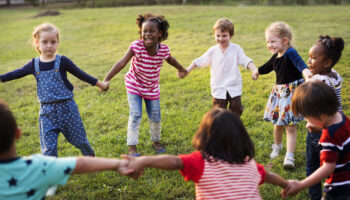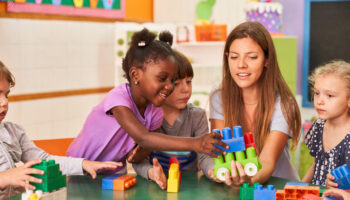By Stefanie Camoni
School-age children come to our programs early in the morning and late in the day. They are engaged in academic learning at school and during out-of-school time. Lessons and activities cover subjects like math and science. Have we stopped however, to think about activities that focus on social-emotional learning? The Collaborative for Academic, Social, and Emotional Learning (CASEL) defines social emotional learning (SEL) as “the process through which children and adults understand and manage emotions, set and achieve positive goals, feel and show empathy for others, establish and maintain positive relationships, and make responsible decisions” (CASEL, undated).
Teaching and using SEL daily can improve students’ social and emotional skills, attitudes, relationships, and academic performance. It can bring a decline in students’ anxiety, behavior problems, and substance use. Bottom line, it can build strong relationships within the program and for the child.
After-school programs offer a safe and highly interactive space for SEL skill development. Activities can be incorporated daily to assist children in developing these skills. There are also social-emotional curricula available as well. In response to the demand of social-emotional learning, The Pennsylvania Department of Education (PDE) is providing guidance to educators on how to address career ready skills in the context of teaching and learning for all students. Although these skills are not a curriculum, they can guide instruction and implementation of activities to promote social-emotional learning. Click here to read more about The Pennsylvania Career Ready Skills. Here you will find background information, the Continuum of skills that cover grades Pre-K-12, and a toolkit.
Here is a sample activity around self-management and regulating ones’ emotions, cognitions, and behaviors. This activity can be found on the CASEL website (The Collaborative for Academic, Social, and Emotional Learning).
Students will be able to… Monitor and regulate emotions effectively. Use awareness of emotions as a guide to decision-making. Motivate oneself. Cope well with stress and anxiety. Exercise self-control and delay gratification. Express emotions appropriately.
What teachers can do in lessons and instruction… Teach the THINK process to help students recognize responsible social media use before posting an unkind or untrue remark about a person because you are upset. T—is it true, H—is it helpful, I—is it inspiring, N—is it necessary, K—is it kind. This activity could be part of the class norms as well. Lead students in an age-appropriate discussion of how to use their awareness of emotions to guide decision-making. With younger children this might mean thinking about what adult they can ask for help or support when they are sad or angry. For older children/teens this might mean helping students think about pausing before making a decision at all, when they are feeling angry or hurt, because it is better to make important decisions when we are feeling calm. Lead discussions about positive, age-appropriate ways we can express our feelings (e.g., put our feelings into words, draw a picture or write about how we feel, create an art or media project, show our feelings through dance). Teach effective, age-appropriate self-management techniques (belly breathing, yoga, counting to ten, self-talk, relaxation exercises, mental rehearsal). Have students brainstorm age-appropriate ways to motivate themselves.
Ongoing Teaching Practices… Routinely practice age-appropriate self-management techniques as a regular part of the school day (e.g., start class with a deep breathing exercise). Establish a separate space in the classroom for individual self-management (e.g., cozy corner, happy place, cool-down corner, reading corner). As a teacher, consistently model effective self-management in an age-appropriate way for students (“I’m feeling a little frustrated, so I’m going to stop and take a breath before I decide what to do next.”)
School-age children and staff will benefit from social emotional learning in before and after school programs. Challenge yourself to incorporate at least one activity per month, then one per week, until you are finding daily opportunities to promote SEL. This will have a positive impact not only on your program, but those that are a part of it.
“If a child can do advanced math, speak 3 languages, or receive top grades, but can’t manage their emotions, practice conflict resolution, or handle stress, none of that other stuff is really going to matter.” Author unknown




